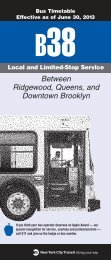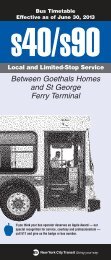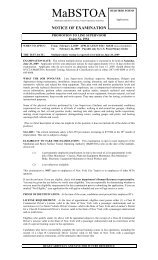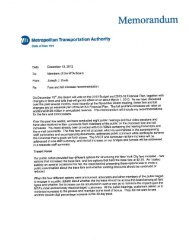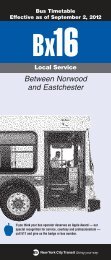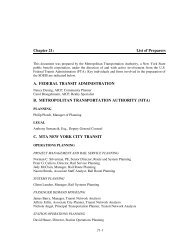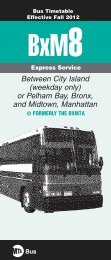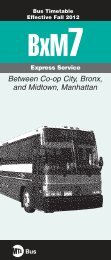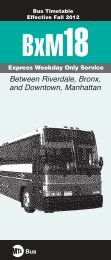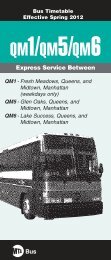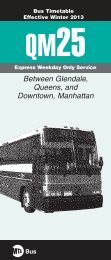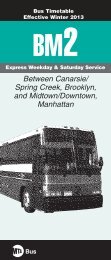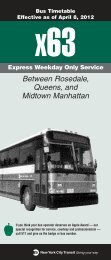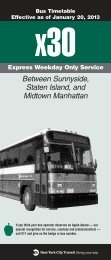Greening Mass Transit & Metro Regions: The Final Report - MTA
Greening Mass Transit & Metro Regions: The Final Report - MTA
Greening Mass Transit & Metro Regions: The Final Report - MTA
Create successful ePaper yourself
Turn your PDF publications into a flip-book with our unique Google optimized e-Paper software.
Waste Management Best Practices at the TTC<br />
<strong>The</strong> Toronto <strong>Transit</strong> Commission (TTC) currently uses<br />
its own compactor trucks and internal services to<br />
collect waste and recyclables from stations, which are<br />
then turned over to a private contractor for sorting,<br />
processing, and sales. <strong>The</strong> contractor keeps the<br />
proceeds from sales, which offsets the costs of<br />
running a transfer station and disposals. By using internal<br />
collection with offsite private sorting, TTC avoids<br />
the need for permits and other costs of maintaining<br />
waste transfers operations. Waste collections are simplified<br />
by the use of different colored plastic bags.<br />
Recyclable and Reusable <strong>Metro</strong>Card<br />
In keeping with Recommendation 4, the <strong>MTA</strong> should<br />
implement a Reuse/Refill Incentive Program by<br />
charging a green fee for each newly purchased<br />
<strong>Metro</strong>Card. This reusable/recyclable <strong>Metro</strong>Card could<br />
be created from 100-percent recycled polyester and<br />
constitute a potential revenue source. This program<br />
could encourage commuters to reuse/refill their<br />
<strong>Metro</strong>Cards, eliminate littering of <strong>Metro</strong>Cards on station<br />
platforms, reduce maintenance operating costs,<br />
and drastically cut <strong>Metro</strong>Card inventory requirements<br />
and costs. In conjunction with a vigorous public<br />
awareness campaign, this program could have a<br />
great impact on commuter behaviors.<br />
Saving Forests One Tie At A Time<br />
<strong>The</strong> <strong>MTA</strong> has formed a Sustainable Railroad Tie Task<br />
Force, with both Track and Procurement representatives<br />
from three <strong>MTA</strong> rail agencies to work toward<br />
increasingly sustainable railroad tie solutions. One of<br />
the types of sustainable railroad ties being introduced<br />
and field tested is made from a composite of recycled<br />
plastic, waste tires, waste fiberglass, and structural<br />
mineral fillers. Innovations in technology and <strong>MTA</strong>’s<br />
adoption of them will substantially reduce the use of<br />
conventional, non-renewable railroad ties.<br />
48<br />
NEAR-TERM RECOMMENDATIONS<br />
Recommendation 1. Adopt Waste Management Targets<br />
<strong>The</strong> <strong>MTA</strong> should adopt robust recycling and waste management targets across<br />
agencies for its customer-generated waste, process-generated waste, construction<br />
and demolition debris, and office waste. <strong>The</strong>se metrics can be developed with current<br />
agency standards and with best practices based on the Commission’s survey of<br />
transit systems. Using this baseline information, the <strong>MTA</strong> can determine realistic<br />
recycling and waste minimization goals for various operations.<br />
Recommendation 2. Introduce Source Separation of Waste in NYCT<br />
Subways<br />
<strong>The</strong> <strong>MTA</strong> should introduce the source separation of recyclable materials in NYCT<br />
subway stations. <strong>The</strong> <strong>MTA</strong> should seek opportunities to partner with New York City<br />
and others on such programs, possibly through street-level collections by the city.<br />
<strong>The</strong> <strong>MTA</strong> should also partner with regional organizations in order to promote consistent<br />
recycling practices and ensure consistency in program design and branding<br />
to achieve greater customer recycling understanding and practices.<br />
Recommendation 3. Reduce Inventory and Warehouse Storage<br />
<strong>The</strong> <strong>MTA</strong> should reduce its inventory and warehouse storage needs and costs.<br />
<strong>The</strong> <strong>MTA</strong> should explore the potential for adopting an agency-wide inventory<br />
management system to reduce materials flow, costs, and energy consumption<br />
related to material management and warehousing.<br />
Recommendation 4. Promote <strong>MTA</strong> Rider and Employee Conservation<br />
In addition to existing programs and the recommended “Environmental Champion”<br />
program, the <strong>MTA</strong> should identify more opportunities for using its visibility and<br />
reach to promote daily conservation of water, materials, paper, fuels, and more<br />
among its millions of riders and more than 70,000 employees.<br />
Recommendation 5. Increase Sustainable Waste Management<br />
<strong>The</strong> <strong>MTA</strong> should continue to reduce landfill waste and reduce demand for new<br />
materials by expanding its reuse of <strong>MTA</strong> building materials and purchasing other<br />
used or recycled materials.<br />
Recommendation 6. Minimize Materials Packaging<br />
<strong>The</strong> <strong>MTA</strong> should continue to minimize materials packaging by revisiting procurement<br />
specifications to require alternative or reduced packaging, incentivizing reduced<br />
packaging and shipping weights among <strong>MTA</strong> vendors and contractors, and specifying<br />
a percentage reduction of packaging as criteria to evaluate procurement bids.<br />
Recommendation 7. Encourage Use of Low-Carbon Local Materials at all<br />
<strong>MTA</strong> Agencies and by Vendors<br />
<strong>The</strong> <strong>MTA</strong> should continue to encourage the use of low-carbon, local materials at all<br />
agencies and by vendors. Current <strong>MTA</strong> procurement statutes provide for New York<br />
State content to be given priority consideration on procurements for rail cars, buses,<br />
and other materials. Public Authorities Law Section 2879 includes provisions for<br />
tracking in-state and out-of-state vendors. However, the <strong>MTA</strong> should be more<br />
explicit in encouraging procurements that avoid the carbon and other GHG emissions<br />
associated with long-distance shipping. <strong>The</strong> same should apply to <strong>MTA</strong> contractors<br />
and vendors.



